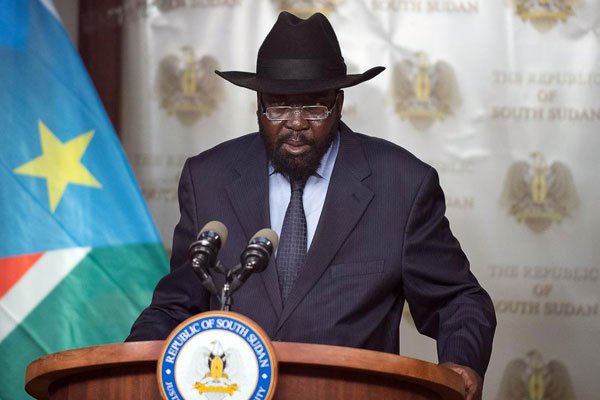The emergence of splinter groups among South Sudan’s warring parties is threatening to derail further efforts to bring the war-torn country to peace, an organ formed to monitor the peace deal say.
At a meeting to brief stakeholders on the respect for ceasefire, Ethiopian military officer Maj-Gen Molla Hailemariam told the audience that both sides have violated the peace deal, something which could worsen if new rebel groups continue to emerge.
“The presence and emergence of different armed groups in other areas still remains a challenge for Ceasefire and Transitional Security Arrangements Monitoring Mechanism (CTSAMM) in conducting its activities.
“CTSAMM is observing deliberate, well planned attacks being committed by both Parties in many areas of the country. These violations indicate a gross disregard for the Permanent Ceasefire and they must stop,” he said in Juba last week.
CTSAMM is an organ made up of representatives from warring parties that signed the peace agreement in 2015.
It also includes representatives of political parties, former detainees, women’s guild, civil society organisations, clerics, the African Union, donors and the Intergovernmental Authority on Development (Igad).
OUST PRESIDENT KIIR
Currently chaired by Maj-Gen Hailemarriam, it is supposed to ensure that the parties stick by the ceasefire contained in Chapter II of the peace agreement, thought to be necessary for the country to move from its war years.
But as the CTSAMM board met to deliberate and update for the African Union’s Joint Monitoring and Evaluation Commission on the security situation, another former government official declared he had formed a new rebel group aimed at ousting President Salva Kiir.
Thomas Cirillo Swaka, until last month the Deputy Chief of General Staff for Logistics in the national army, SPLA, said he was now leading the National Salvation Front (Nas) motivated by the desire for a “citizen-imposed change.”
The new group was declared even as the National Constitutional Amendment Committee led by Kenyan lawyer Gichira Kibara announced it would table its draft changes to the government in Juba, next week.
But the draft changes, most of which are centred on altering the peace agreement into a permanent supreme law now face a challenge of who, among the parties, should be consulted before they are endorsed.
MAKE IT DIFFICULT
Maj-Gen Hailemarriam warned the splintering and disrespect for the agreement could make it difficult to implement all the clauses.
“These actions (of violence) have a detrimental effect on the peace and security of the country and despite our continuous reporting on this issue we are yet to see any change in relation to the commitment to the ceasefire,” he said during a meeting with members of his team.
Meanwhile, South Sudan rebels loyal to former Vice President Riek Machar are threatening to derail plans to implement major cross-border infrastructure projects in the region if they are not consulted.
They want to be party to negotiations by claiming the planned transport infrastructure will pass through areas they control.
“The Eastern (and) Central Corridor Project will not work unless the SPLM-IO under the leadership of former vice president Dr Machar (are) involved for its smooth running,” warned Dickson Gatluak, Spokesman for rebels often known as Sudan People’s Liberation Movement-in-Opposition (SPLM-IO).
“To guarantee a smooth implementation, there is a need to involve in the SPLM-IO. Otherwise it’s a wishful thinking and all agreements would remain unworkable on papers (sic),” the official said in a statement.
Gatluak has since been replaced as spokesman with Gabriel Duop Lam who resigned last month from the Transitional government under Salva Kiir. In his resignation letter, Lam who was the Minister for Labour accused Mr Kiir of corruption and brutality, before he shifted allegiance to Dr Machar.
SEEK ATTENTION
The threat to block infrastructure project appear to be a new modus operandi to seek attention, especially since Dr Machar was replaced by Taban Deng Gai and quickly accepted by the international community.
The projects, part of the larger East African Community and the Southern African Development Cooperation (Comesa ) arrangement is a tripartite plan mooted six years ago to address the transportation challenges in the region, blamed for low trade between these countries.
The countries directly involved initially were Burundi, Kenya, Tanzania and Rwanda but the Corridor was designed to link up the Democratic Republic of Congo, South Sudan and Ethiopia.
Though certain changes have taken place since it was mooted, it was initially designed to cost at least $1.8 billion and could see five new ports, railway lines and at least eight cross-border highways built.
In South Sudan, an ambitious plan was laid to have a crude-oil pipeline, a refinery, an oil storage facility, a fiber optics cable and power supply line established between Pagak in eastern South Sudan, Gambella in western Ethiopia, Addis Ababa and the Djibouti city.
The idea is to help develop the areas as well as connect the three countries. But now the rebels say that won’t happen unless they take part in discussions.
Mr Gatluak claimed that the people in the South Sudan side are not yet recovered from the violence and would automatically be hostile to such projects unless a “healing” initiative is launched.
Officially, President Kiir’s government denies that rebels control any significant territory and could therefore have no impact in the negotiations.
South Sudan Information Minister Michael Makuei last week accused the rebels of desperate attempts to discredit the government in Juba.
“What do you expect the rebels to say about the government they oppose? They will say bad things so this is a normal thing and it is expected.
“If any individual has decided to live a rebellious life, they are free to go. It is not going to affect the strength of the government in any way,” he told the Nation in an interview.
©Alleastafrica and Daily Nation



